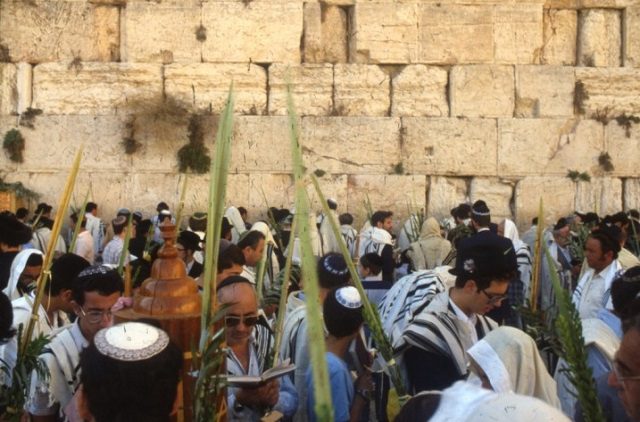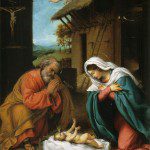(9-21-09)
[all passages RSV]
St. Paul gives believers freedom to think one day “better than another”:
Romans 14:5-6a One man esteems one day as better than another, while another man esteems all days alike. Let every one be fully convinced in his own mind. [6] He who observes the day, observes it in honor of the Lord. . . .
By analogy to the Old Covenant and early Christian adherence to its particulars, the Church has the prerogative to set mandatory holy days. Moreover, there is biblical evidence for the notion of a holy day. The most obvious is the Sabbath itself:
Exodus 16:23 he said to them, “This is what the LORD has commanded: ‘Tomorrow is a day of solemn rest, a holy sabbath to the LORD . . .
Exodus 20:8 Remember the sabbath day, to keep it holy
Exodus 31:15 Six days shall work be done, but the seventh day is a sabbath of solemn rest, holy to the LORD (cf. 35:2; Lev 23:3; Deut 5:12-13; Neh 13:22; Is 58:13; Jer 17:22, 24, 27)
Leviticus 23:8 . . . on the seventh day is a holy convocation . . .
Additional days are described as especially “holy” too:
Leviticus 23:15-16, 21 “And you shall count from the morrow after the sabbath, from the day that you brought the sheaf of the wave offering; seven full weeks shall they be, [16] counting fifty days to the morrow after the seventh sabbath; then you shall present a cereal offering of new grain to the LORD. . . . [21] And you shall make proclamation on the same day; you shall hold a holy convocation; you shall do no laborious work: it is a statute for ever in all your dwellings throughout your generations.
Leviticus 23:24-25 “Say to the people of Israel, In the seventh month, on the first day of the month, you shall observe a day of solemn rest, a memorial proclaimed with blast of trumpets, a holy convocation. [25] You shall do no laborious work; and you shall present an offering by fire to the LORD.”
Leviticus 23:27-28 “On the tenth day of this seventh month is the day of atonement; it shall be for you a time of holy convocation, and you shall afflict yourselves and present an offering by fire to the LORD. [28] And you shall do no work on this same day; for it is a day of atonement, to make atonement for you before the LORD your God.
Leviticus 23:33-37 And the LORD said to Moses, [34] “Say to the people of Israel, On the fifteenth day of this seventh month and for seven days is the feast of booths to the LORD. [35] On the first day shall be a holy convocation; you shall do no laborious work. [36] Seven days you shall present offerings by fire to the LORD; on the eighth day you shall hold a holy convocation and present an offering by fire to the LORD; it is a solemn assembly; you shall do no laborious work. [37] “These are the appointed feasts of the LORD, which you shall proclaim as times of holy convocation, for presenting to the LORD offerings by fire, burnt offerings and cereal offerings, sacrifices and drink offerings, each on its proper day;
Leviticus 23:39-41 “On the fifteenth day of the seventh month, when you have gathered in the produce of the land, you shall keep the feast of the LORD seven days; on the first day shall be a solemn rest, and on the eighth day shall be a solemn rest. [40] And you shall take on the first day the fruit of goodly trees, branches of palm trees, and boughs of leafy trees, and willows of the brook; and you shall rejoice before the LORD your God seven days. [41] You shall keep it as a feast to the LORD seven days in the year; it is a statute for ever throughout your generations; you shall keep it in the seventh month.
(cf. Num 28:18, 25-26; 29:1, 7, 12)
Nehemiah 8:9-11 And Nehemi’ah, who was the governor, and Ezra the priest and scribe, and the Levites who taught the people said to all the people, “This day is holy to the LORD your God; do not mourn or weep.” For all the people wept when they heard the words of the law. [10] Then he said to them, “Go your way, eat the fat and drink sweet wine and send portions to him for whom nothing is prepared; for this day is holy to our Lord; and do not be grieved, for the joy of the LORD is your strength.” [11] So the Levites stilled all the people, saying, “Be quiet, for this day is holy; do not be grieved.”
Nehemiah 10:31 and if the peoples of the land bring in wares or any grain on the sabbath day to sell, we will not buy from them on the sabbath or on a holy day; and we will forego the crops of the seventh year and the exaction of every debt.
2 Maccabees 6:11 Others who had assembled in the caves near by, to observe the seventh day secretly, were betrayed to Philip and were all burned together, because their piety kept them from defending themselves, in view of their regard for that most holy day.
The early Christians observed the Jewish feasts (e.g., Jn 4:45; 5:1; 7:1-2,11,37; 12:20), including Passover (Matthew 26:17-19; Mk 14:12-16; Lk 22:1-15; Jn 2:13,23). The Last Supper was a Passover ceremony. Therefore, the explicit Old Testament evidence for holy days was carried over into the New Covenant, with the express sanction (by their own practice) of our Lord Jesus and St. Paul.













